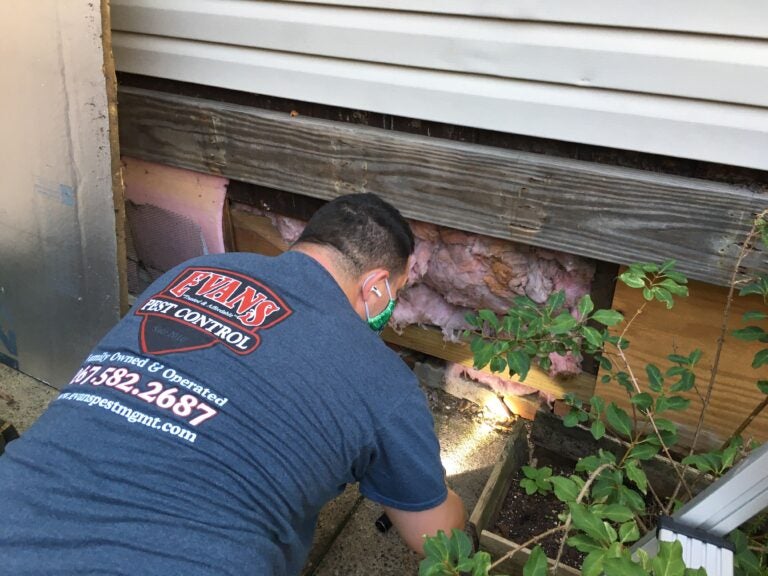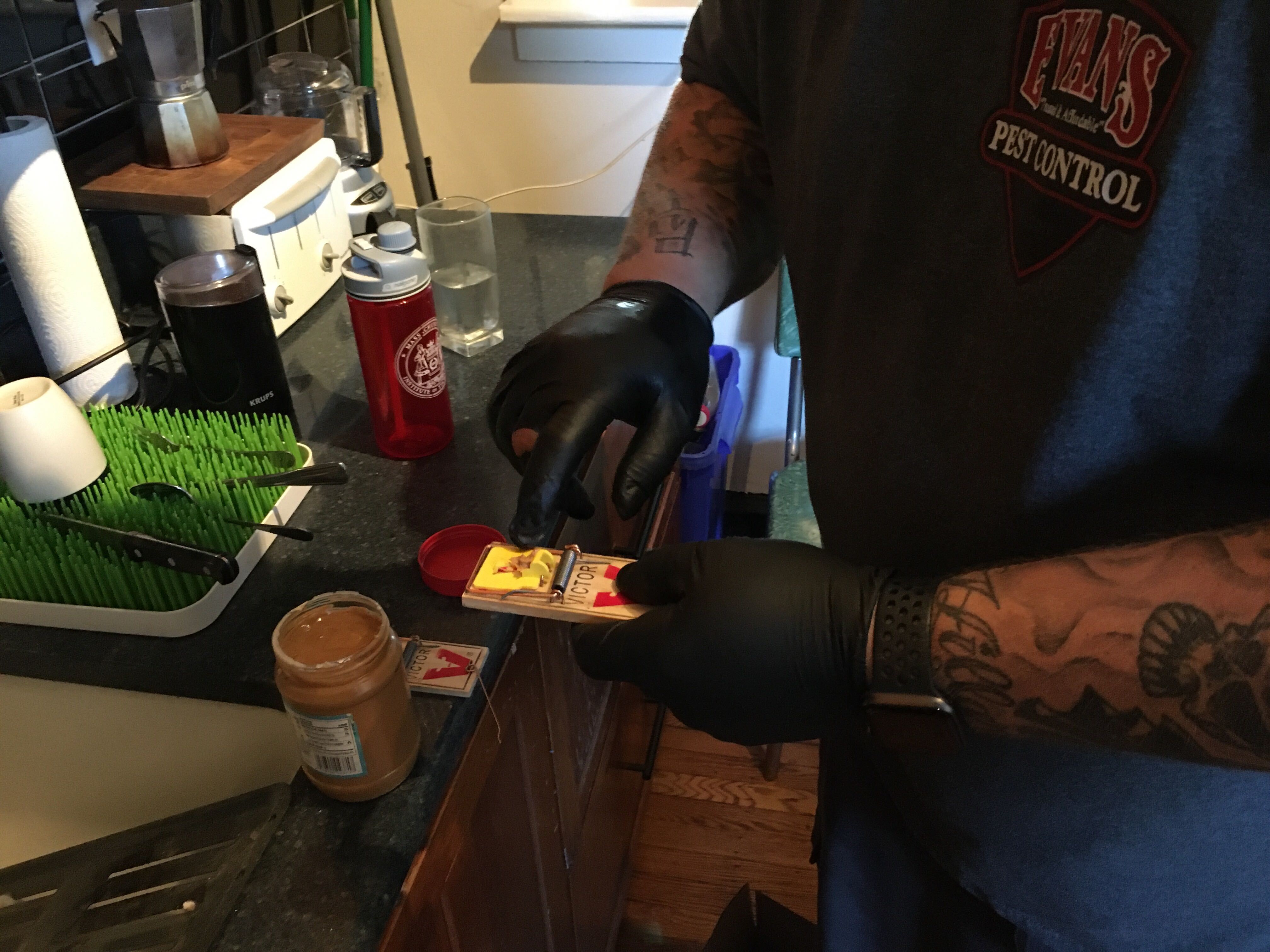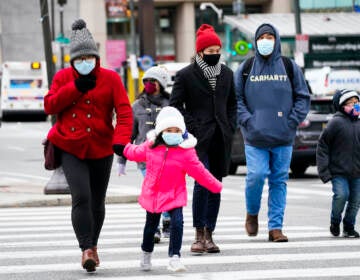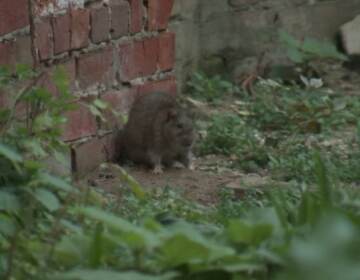Rats in rowhouses, opossums in bottles: Philly exterminators see booming biz as trash sits
It’s a busy time for the pest control business in Philadelphia.
Listen 2:02
Charles Evans looking for cracks in a Kensington home. Mice can fit in a hole the size of a dime, rats in a hole the size of a quarter. (Catalina Jaramillo/WHYY)
Mildred Fres lived in her Kensington home for 43 years without a pest problem.
That changed this summer — and not because she has changed the way she cleans her tidy Norris Square home. Suddenly, as the weather warmed up this year, she began to see rats, mosquitos, cockroaches and mice scurrying underfoot.
“It’s horrible,” Fres said in Spanish, standing on her sunny terrace. “Too much trash, nobody picks it up.”
All summer long, bags full of rotting trash bags sat on Fres’ street for days, sometimes even weeks. The delays in trash and recycling collection transformed the city’s streets and alleys into a veritable paradise for rodents, insects and other animals who enjoy snacking on human discards. Once the critters found themselves so close to homes, it wasn’t hard to burrow into the aging rowhouses planted on the pavement. Fres said rats have never before invaded her basement — a worrying influx because insects and rodents can transmit diseases and trigger asthma at a time when she is already concerned about respiratory health.

She’s not alone. In April, a month after the stay-at-home order went into effect, local exterminators and other experts said residents were seeing more mice and rats at home because rodents lost meals at their favorite restaurant dumpsters once those closed, and went looking for food where they could find it: in homes. Five months later, the problem has escalated.
“May, June, July… I mean, things just took off,” said Charles Evans, founder and owner of Evans Pest Control, a 10-year-old company based in Port Richmond.
Evans said his new normal workday involves treating 12 homes a day — 80 a month. Most of the calls are for rodents, he said, and he’s been using more rodent bait than ever.
“In a whole year, we would go through about a ton of bait. That’s 2,000 pounds throughout a year. We’re doing almost 50 pounds a week now,” he said. That day he had already banished pests from 17 different houses.
Evans said he’s fielded more complaints about flies, mosquitoes, cockroaches, opossums and raccoons this summer too.
“I’m assuming more than likely it’s coming due to the trash that’s not being picked up, restaurant closures, and then people being home and actually noticing the rodent issues that people were having,” he said.
YALL PLZ HELP ME BLOW THIS UP 🙏the possum is back— I REPEAT — PABLO PICOSSUM is stuck in the fire escape again! Last time @ACCTPhilly said they couldn’t come into the house to remove him due to #COVID19 but like…I can’t deal w this again my anxiety is 🤯PLZ RT & GET THEIR ATTN pic.twitter.com/9iLu6IzoMI
— Rachel Marie (@RACH_ontheradio) May 5, 2020
Rich Foreman, from Dynamite Pest Control, a family-owned company based in West Philadelphia, said this summer he got three times the normal amount of calls from desperate residents.
A similar spike hit ACCT Philly, the region’s largest animal care and control service provider. Spokesperson Sarah Barnett said even though her organization does not respond to complaints when animals are healthy and outside, there was a jump in calls about raccoons and opossums when the pandemic started.
She said at first it was normal for people to see more of them — spring is baby season, and these animals are usually active during the day. People normally miss them, because they’re at the office, she said.
But the nature of calls changed during the trash crisis, with more of them getting injured.
“We had a call about an opossum who was stuck in a Snapple bottle,” she said.
Fortunately, the opossum was saved. But Barnett said the more trash out in the streets, the more wildlife issues are going to occur. Especially if containers are not rinsed and trash cans have no lids.
Mosquito season
Darryl Thomas, 59, was sitting outside of his home in Kensington on a recent Tuesday morning.
“The insects have been really biting,” he said.
Thomas, who has lived there for 13 years and often sits outside, said there’s always been gnats, but not as many mosquitoes as now.
“Now you got the mosquitoes and the gnats, and they’re biting very, very, very severely,” he said.
A couple of houses north, Rafael Jimenez, 44, said he’s also seeing more gnats, ants and mosquitoes in his house than ever before. He’s been living there most of his life.
“There’s a lot more this summer,” he said.
Michelle Niedermeier, Penn State’s community IPM and environmental health program coordinator with the Pennsylvania Integrated Pest Management Program in the Philadelphia County Cooperative Extension Office, said there are various reasons why people have been seeing more pests lately.
With more people staying at home, chances of pest-to-human encounters rise. And it might just be that residents are noticing things in ways that they hadn’t previously taken note of.
“It is mosquito season,” she said, “so mosquitoes hatching out is not surprising.”
Having a mouse in the house is not an unusual occurrence in Philadelphia either, she said. Houses are old and often in need of repair — and mice and rats can fit in a hole the size of a dime and a quarter, respectively. Rowhomes don’t help either, because houses are connected to one another, giving rodents more opportunities.
But catching a mouse in the house at this time of the year, as she did a couple of weeks ago in her basement, is a little bit more out of the ordinary — they usually come inside when it gets cold outside. And even if there’s no hard data to prove it, she said it would make sense to blame it on the trash.

“Every pest problem boils down to food, water, and shelter,” Niedermeier said. “If there’s trash and recycling sitting around for longer periods of time within our spaces and outside of our homes — or if it’s strewed about the streets from dogs or cats or other animals breaking into trash cans and looking for food — then there’s food, water, and shelter, [and so] we might see more mosquitoes having breeding spots, more mice and other rodents, and flies being about as well.”
That could lead to several health problems. Rodents, cockroaches and mosquitoes can spread several diseases. By the beginning of September, the city announced the first case of West Nile Virus of the season.
Niedermeier, who has been helping Philadelphians to get rid of mice, mosquitoes, roaches and bed bugs for about 20 years, said dealing with a pest can be expensive and overwhelming, especially during a pandemic.
The Philadelphia Health Department’s Vector Control Services complaint line, which tracks reports from rats and mosquitoes, has gotten fewer calls this summer than in previous years. According to city records, this summer there were 1,636 rat complaints — compared to 2,005 in 2019 and 2,048 in 2018 — and so far there are only 65 complaints for mosquitoes, compared to 215 last year, although the season goes until the end of October. Mosquitoes spread West Nile Virus, a neurologic infection that in severe cases can lead to death.
But Niedermeier said that’s not all that surprising given all the disruptions created by the pandemic.
“People might not be complaining because they have other things to deal with,” she said.
How to keep pests under control
Although pests can impact everyone, Niedermeier said low-income residents and renters often have less resources to deal with pests and less control on factors that could lead to more uninvited guests, such as having a place to take trash outside, making home repairs or living in multi-family units.
“If you keep your apartment nice and tidy and clean and everything’s great, but your neighbor is a complete slob and there’s trash and debris and clutter, sometimes a lot of pests will move through cracks and crevices between apartments or, you know, out one door, down the hallway and under the next door,” she said.
The best thing, she said, is to try to prevent rodents and insects from coming into homes in the first place. Some good practices to prevent mice are sealing up cracks and crevices with silicone caulk, copper mesh or hardware cloth; installing door sweeps under doors; keeping snap traps in the basement and other safe spaces all the time; and to communicate with your neighbors if you see some in your house.
To prevent mosquitos, experts recommend using windows screens and fans, eliminating sources of standing water and using repellents. Pests can also be prevented by eliminating their food and water needs by cleaning up crumbs and spills, storing food in hard containers with lids, fixing leaking pipes or faucets, and keeping yards and vacant lots clear of trash.
“So it does take time and some resources,” she said, “but it’s not a difficult task to undertake yourself.”

Subscribe to PlanPhilly
WHYY is your source for fact-based, in-depth journalism and information. As a nonprofit organization, we rely on financial support from readers like you. Please give today.






![CoronavirusPandemic_1024x512[1]](https://whyy.org/wp-content/uploads/2020/03/CoronavirusPandemic_1024x5121-300x150.jpg)



